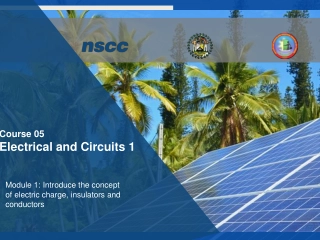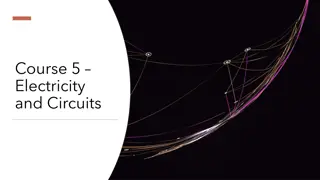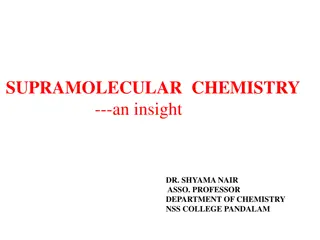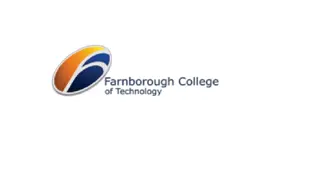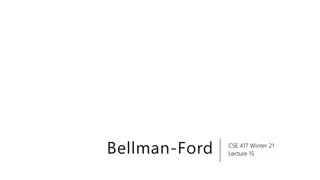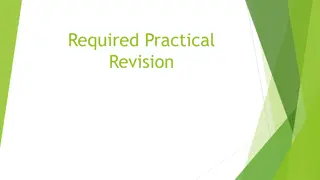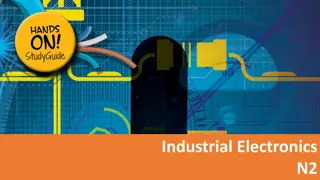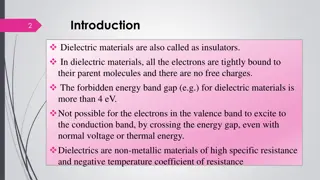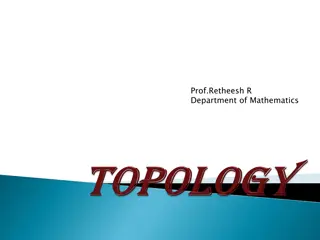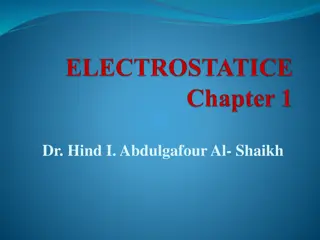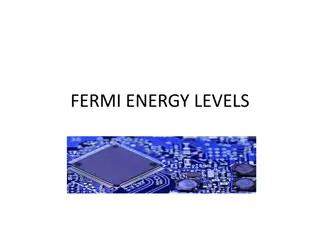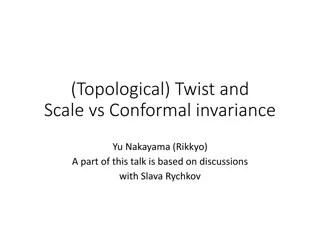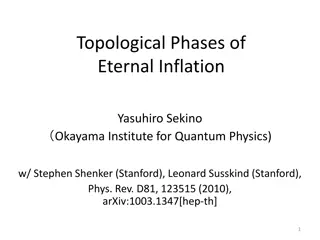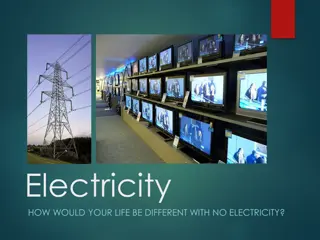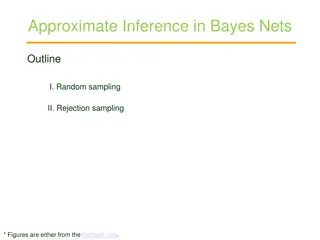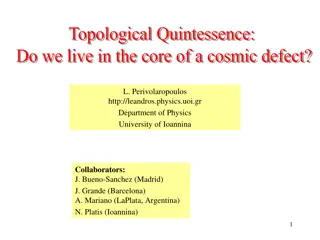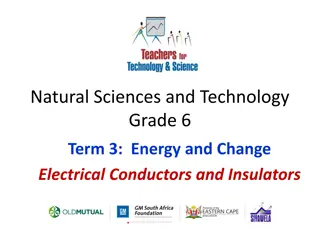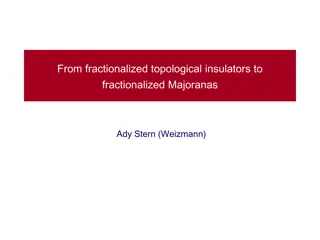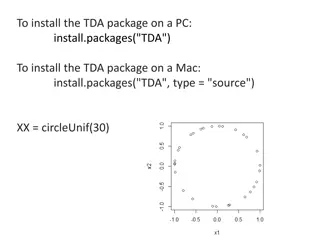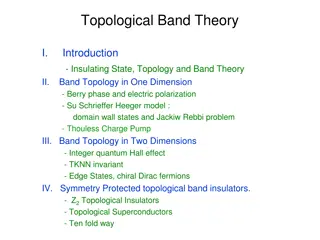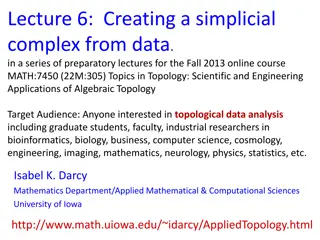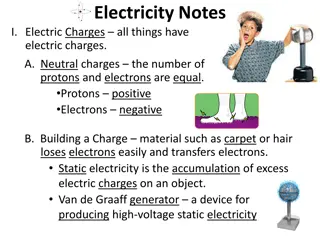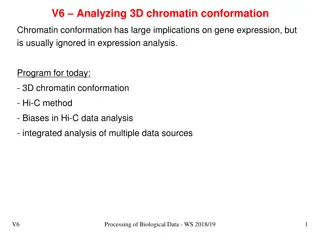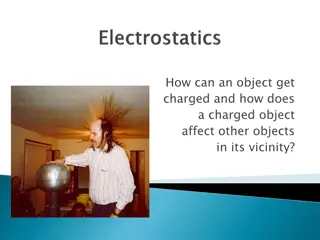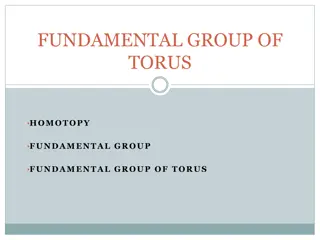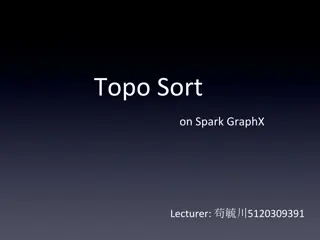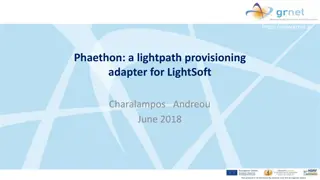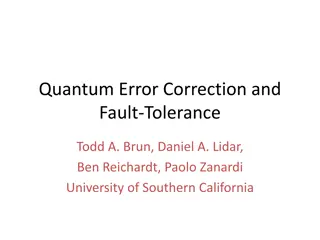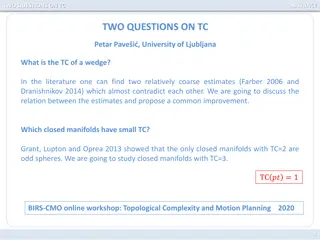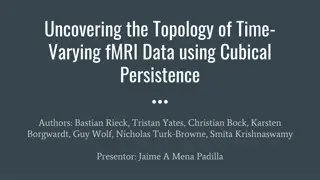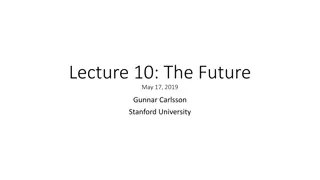Electrical and Circuits 1
Electric charge, insulators, conductors, and electrical flow through materials. Understand static electricity and examples of static charge uses. Discover the concept of insulators with analogies and examples.
0 views • 26 slides
ECE 305 Electromagnetic Theory
Explore the fundamental concepts of electric fields in material space, covering topics such as free space, conductors, insulators, semiconductors, current conduction, and charge density. Delve into the properties of materials, convection vs. conduction current, and the role of superconductors in ele
1 views • 25 slides
Exploring Electricity Concepts: From Atoms to Static Electricity
This content delves into the basics of electricity, covering topics such as atoms, charges, static electricity, simple circuits, and more. Learn about the difference between naturally occurring and human-harnessed electricity, explore the concept of charges in objects, and discover how static electr
5 views • 14 slides
Understanding Electricity and Circuits: Basics, Components, and Applications
This educational course covers topics such as circuit symbols, calculating and measuring electrical quantities, identifying circuits, and understanding the relevance of electricity in engineering. It explains essential circuit components like energy sources, conductors, insulators, loads, control de
12 views • 30 slides
Exploring Supramolecular Chemistry: Insights and Applications
Supramolecular chemistry delves into the chemistry of molecular assemblies, intermolecular bonds, and non-covalent interactions, leading to the formation of supra-molecules through aggregation of molecular subunits. Concepts like molecular recognition, self-organization, and host-guest chemistry pla
0 views • 18 slides
Understanding Insulators: Properties, Materials, and Testing
An insulator is a crucial device used to support and insulate electric conductors or equipment from ground or other conductors. This article covers the definition, desirable properties, materials used, ratings, and testing methods of insulators, including flashover tests, sample tests, and routine t
1 views • 33 slides
Understanding Electron Theory and the Structure of Matter
The structure of matter is intricately tied to electron theory, where molecules are made up of atoms containing protons and electrons. An electrically neutral atom has an equal number of protons and electrons. A flow of electrons creates an electric current, which can be measured by an ammeter. Cond
0 views • 11 slides
Understanding Bellman-Ford and Dynamic Programming on Graphs
Exploring Bellman-Ford and Floyd-Warshall algorithms, Dijkstra's Algorithm, shortest path problems, dynamic programming on graphs, and solving distances in a directed acyclic graph. Learn about recurrences, evaluation orders, topological sort, and handling cycles in graphs.
1 views • 39 slides
Understanding Thermal Conductors and Insulators in Energy Transfer
Today's lesson focuses on energy transfer, specifically on conductors and insulators. Learn about the characteristics of thermal conductors and insulators, how they affect the flow of thermal energy, and their real-life applications. By the end of this lesson, you will be able to distinguish between
0 views • 13 slides
Overview of Semiconductor Materials and Applications
Understanding electronic transport in semiconductors is essential for various applications such as computers, smartphones, LEDs, and more. Semiconductors like silicon and compound semiconductors play a crucial role in creating devices with unique properties. By delving into the world of semiconducti
0 views • 20 slides
Physics Practical Revision Guide
Explore practical experiments in physics including determining specific heat capacity, investigating thermal insulators, resistance, calculating densities of solid objects and liquids, and more. Get hands-on with measuring mass, volume, temperature changes, and conducting circuit experiments. Enhanc
0 views • 14 slides
Understanding Electrical Principles in Industrial Electronics
Explore the fundamentals of industrial electronics, starting with direct current principles related to atomic theory, conductors, insulators, and resistors in series and parallel. Then, delve into alternating current principles, including generating an alternating voltage, alternating current (AC) b
0 views • 46 slides
Understanding Dielectrics and Insulators in Electrical Engineering
Dielectric materials, also known as insulators, have tightly bound electrons with no free charges, characterized by a forbidden energy band gap of over 4 eV. Insulators, on the other hand, prevent electric current flow due to high resistivity and strong covalent bonds. Learn about the differences, d
1 views • 22 slides
Introduction to Topological Spaces and Examples
Topology is the study of surfaces derived from Greek words meaning surface and discourse. In mathematics, a topological space is a set with a family of subsets satisfying specific properties. Examples include the open ball, open set, indiscrete topology, discrete topology, co-finite topology, and co
0 views • 14 slides
Combining Graph Algorithms with Data Structures and Algorithms in CSE 373 by Kasey Champion
In this lecture, Kasey Champion covers a wide range of topics including graph algorithms, data structures, coding projects, and important midterm topics for CSE 373. The lecture emphasizes understanding ADTs, data structures, asymptotic analysis, sorting algorithms, memory management, P vs. NP, heap
0 views • 38 slides
Understanding Electrical Conductors and Insulators
Electrical conductors like metals allow the flow of charge, while insulators like wood and plastic impede the flow. Copper, silver, and aluminum are examples of good conductors, with high conductivity. Insulators have high resistivity, preventing the easy flow of electric current. Learn about the pr
3 views • 5 slides
Understanding Electric Charges and Conductors in Physics
Explore the fundamentals of electrostatics, electric charges, conductors, and insulators in physics. Learn about the Law of Electric Charges, types of charge, conductors vs. insulators, and methods of charging objects through friction, conduction, and induction. Dive into the world of atoms, electro
1 views • 14 slides
Guide to Different Types of Hardware for Gates and Fences
Learn about various types of hardware used for gates and fences, including gate latches, strap hinges, butt hinges, T-hinges, barrel bolts, continuous hinges, electric fence insulators, wire stretchers, wire grips, welded wire fences, and T-post insulators. Explore their functions and common uses wi
0 views • 26 slides
Understanding Insulators and Energy Bands in Materials
Explore the concept of insulators and energy bands in materials, focusing on the forbidden gap, Fermi energy levels, and the classification of solids based on electrical conductivity. Learn about the role of insulators, the energy gap in insulators, and examples of insulating materials like rubber a
0 views • 48 slides
Understanding Scale vs. Conformal Invariance in Theoretical Physics
Delve into the intriguing concepts of scale invariance and conformal invariance in theoretical physics through discussions on topics such as topological twist, critical phenomena, unitarity arguments, and counterexamples. Explore the fine balance between these two powerful symmetries and their impli
0 views • 19 slides
Understanding Topological Phases of Eternal Inflation in Metastable Vacuum Theory
Exploring the coupling of gravity in a theory with metastable vacuum through the lens of topological phases of eternal inflation. Investigating the behavior of false and true vacua, de Sitter space, and bubble nucleation, offering insights into string theory landscapes and observational implications
0 views • 26 slides
Understanding Electricity: Conductors, Insulators, and Current
Electricity is essential for modern life, with conductors allowing electron flow and insulators preventing it. Learn about the basics of atoms, electrons, and how electricity works through conductors and insulators. Discover the role of current and how electrons behave in different materials, drawin
0 views • 19 slides
Approximate Inference in Bayes Nets: Random vs. Rejection Sampling
Approximate inference methods in Bayes nets, such as random and rejection sampling, utilize Monte Carlo algorithms for stochastic sampling to estimate complex probabilities. Random sampling involves sampling in topological order, while rejection sampling generates samples from hard-to-sample distrib
0 views • 9 slides
Topological Quintessence: Anomalous Cosmic Anisotropies and Dark Flow Directions
The consistency of Cold Dark Matter (CDM) with observational data has improved over the past decade, but tensions remain with various cosmic anomalies such as preferred anisotropy axes and dark flow directions. Topological Quintessence, a physical mechanism proposed by L. Perivolaropoulos and collab
0 views • 26 slides
Jeff Edmonds - Research Interests and Academic Courses
Jeff Edmonds is a researcher with interests in various theoretical and mathematical topics, including scheduling algorithms, cake cutting, and topological embeddings. He also provides support for mathematical and theoretical topics. Additionally, Jeff has ventured into machine learning to explore ne
0 views • 17 slides
Understanding Electrical Conductors and Insulators in Grade 6 Natural Sciences and Technology
Explore the topic of electrical conductors and insulators in Grade 6 Natural Sciences and Technology, learning about wiring a three-pin plug, the colors of the live, neutral, and earth wires, and the steps involved in wiring a South African three-pin plug. Gain insight into the roles of each wire an
0 views • 14 slides
Exploring Fractionalized Topological Insulators and Majoranas
This discussion delves into the transition from fractionalized topological insulators to fractionalized Majorana modes, highlighting key concepts in topological phases of matter, quantum Hall effects, and interactions in fractional quantum Hall effects. Emphasis is placed on 3D topological insulator
0 views • 23 slides
Understanding Topological Data Analysis (TDA) with Persistence Diagrams
Dive into the world of Topological Data Analysis (TDA) by learning how to install the TDA package on different operating systems and interpreting the plots of data points, barcodes, and persistence diagrams. Explore the visualization of cycles in different dimensions and understand the concepts of H
0 views • 17 slides
Exploring Topological Band Theory and Quantum Phases in Electronic Matter
Delve into the fascinating realm of topological band theory, examining the insulating state, band topology in different dimensions, symmetry-protected topological band insulators, and the interplay between symmetry and topology. Uncover the principles underlying matter symmetry, quantum phases, and
0 views • 29 slides
Introduction to Creating Simplicial Complexes from Data
Learn how to create a simplicial complex from data points through a step-by-step process. Starting with 0-dimensional vertices and defining closeness between data points, progress to adding 1-dimensional edges. Ideal for those interested in topological data analysis across various fields.
0 views • 73 slides
Understanding Electricity: Charges, Conductors, Insulators, and Storms
Explore the fundamentals of electricity, including electric charges, neutral charges, static electricity, conductors, insulators, lightning storms, and the phenomenon of lightning strikes. Learn about the laws of conservation of charge, electric fields, and the properties of conductive and insulatin
0 views • 23 slides
Insights into 3D Chromatin Conformation Analysis
Chromatin conformation analysis is crucial for understanding gene expression dynamics. Today's program covers topics such as 3D chromatin organization, Hi-C method, biases in Hi-C data analysis, and integrated analysis of data sources. Techniques like Chromosome Conformation Capture Technologies and
0 views • 34 slides
Understanding Electric Charge and Interactions Between Objects
Matter is composed of neutrons, protons, and electrons with different charges. Being charged means having an excess or shortage of charge. Grounding, insulators, conductors, and methods of charging play important roles in how objects get charged. By contacting charged objects with objects that can g
0 views • 33 slides
Understanding Homotopy and Fundamental Groups in Topology
Explore the concepts of homotopy and fundamental groups in topology, where objects with the same structure can be classified into classes, and the fundamental group characterizes loops. Discover the fundamental group of a torus, its identity elements, closure, associativity, and inverses. Homotopy a
0 views • 10 slides
Understanding Topological Sorting in Spark GraphX
Explore the essential concepts of Topological Sorting in Spark GraphX, including necessary background knowledge, stand-alone versus distributed implementations, and practical examples. Delve into Spark GraphX's capabilities, such as RDD manipulation, high-level tools, and graph parallel computation.
0 views • 56 slides
Overview of Phaethon: LightPath Provisioning Adapter for LightSoft
Phaethon is a lightpath provisioning adapter designed for LightSoft, providing capabilities such as reconfigurable optical add-drop multiplexing and transponder filtering. It integrates with the GRNET OSS/BSS stack and facilitates operations like transforming CORBA calls to HTTP REST calls and manag
0 views • 25 slides
Quantum Error Correction and Fault Tolerance Overview
Quantum error correction and fault tolerance are essential for realizing quantum computers due to the challenge of decoherence. Various approaches, including concatenated quantum error correcting codes and topological codes like the surface code, are being studied for fault-tolerant quantum computin
0 views • 19 slides
Understanding Topological Complexity Estimations and Regularity of Spaces
Discussion on the varying estimates of topological complexity for wedges, closed manifolds, and other spaces, along with the analysis of TC-regularity. This includes contrasting estimates, proofs, and examples of TC regularity in different spaces like spheres and Lie groups.
0 views • 11 slides
Uncovering the Topology of Time-Varying fMRI Data using Cubical Persistence
Authors present a novel framework to transform time-varying fMRI data into topological representations, utilizing cubical persistence to analyze brain state trajectories and cluster participants based on topological features in blood flow in the brain, providing insights into cognitive processes. fM
0 views • 11 slides
Advanced Topics in Topological Data Analysis: Research Highlights
Explore cutting-edge research in Topological Data Analysis (TDA) through topics such as Mapper Stability Measures, Deep Learning advancements, Vectorization techniques, Generalized Persistence modeling, Stochastic Aspects analysis, Formal Properties of Persistence, and Complement Problems in TDA app
0 views • 8 slides
